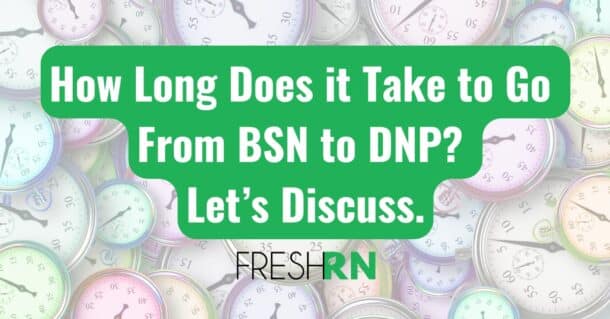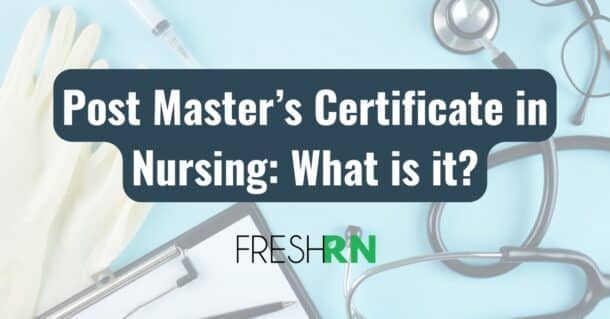Burnout isn’t just a buzzword, it’s something way too many nurses are quietly battling behind the scenes. The overwhelm, the emotional fatigue, the detachment… it builds slowly until you’re not just tired, you’re questioning everything.
Below is a curated list of nurse burnout articles that actually help. Not just to define the problem, but give you tools to manage it and move forward. From evidence-based interventions to systemic research, these resources offer clarity, validation, and hope. Plus, there’s one article in here you probably haven’t read yet, but should.
👀 Seeing signs of burnout creeping in? Sometimes a change in specialty is what you really need. Find programs near you and explore your options. 👇

Table of Contents
📚 Scholarly Articles on Nurse Burnout
If you’re looking for well-researched, peer-reviewed insight into the burnout crisis, here’s a breakdown of all the scholarly articles on nurse burnout from the lists below that offer critical data and analysis. Whether you’re writing a paper, advocating for change on your unit, or simply want to understand the evidence behind the experience, these are a great place to start:
1. Li, L. Z., Yang, P., Singer, S. J., Pfeffer, J., Mathur, M. B., & Shanafelt, T. (2024). This meta-analysis found that higher nurse burnout levels are significantly associated with declines in patient safety, satisfaction, and overall quality of care, emphasizing the systemic impact of burnout on healthcare outcomes.
🔗 Link: https://pubmed.ncbi.nlm.nih.gov/39499515/
2. Khatatbeh, H., Pakai, A., Al-Dwaikat, T., Onchonga, D., Amer, F., Prémusz, V., & Oláh, A. (2024). The review highlights a strong inverse relationship between nurse burnout and quality of life, underscoring how chronic workplace stress depletes emotional, psychological, and physical well-being among nurses.
🔗 Link: https://doi.org/10.1002/nop2.936
3. Lee, H. F., Kuo, C. C., Chien, T. W., & Wang, Y. R. (2023). This meta-analysis found that targeted interventions—particularly those focused on mindfulness and communication training—can effectively reduce emotional exhaustion and depersonalization in clinical nurses.
🔗 Link: https://doi.org/10.1038/s41598-023-38169-8
4. Baek, G., & Cha, C. (2024). A randomized trial tested AI-customized interventions (mindfulness, storytelling, laughter therapy) and found significant reductions in burnout, showcasing the potential of personalized, tech-enabled support systems.
🔗 Link: https://doi.org/10.1111/wvn.70003
5. Bazan, G. N., Patterson, T., Sawyer, K., Kamau, D. W., Bradberry, M., Grissman, C., Mihandoust, S., Roney Hernández, J. K., Stennett, C. R., & Long, J. D. (2025). This study evaluated a 6-week mindfulness intervention and demonstrated marked improvements in emotional exhaustion and stress reduction among acute care nurses.
🔗 Link: https://doi.org/10.4037/ajcc2025260
6. Woo, T., Ho, R., Tang, A., & Tam, W. (2020). A global meta-analysis that quantified the prevalence of burnout, finding particularly high rates of emotional exhaustion and depersonalization in hospital nurses worldwide.
🔗 Link: https://doi.org/10.1016/j.jpsychires.2019.12.015
7. Bakhamis, L., Paul, D. P., Smith, H., & Coustasse, A. (2019). This article reviews hospital-based causes of burnout such as inadequate staffing and high patient loads, and offers management-level recommendations for systemic reform.
🔗 Link: https://doi.org/10.1097/HCM.0000000000000243
8. Gómez-Urquiza, J. L., De la Fuente-Solana, E. I., Albendín-García, L., Vargas-Pecino, C., Ortega-Campos, E., & Cañadas-De la Fuente, G. A. (2017). This meta-analysis reported that emergency nurses are particularly prone to burnout due to high-acuity environments, limited control over workload, and frequent exposure to trauma.
🔗 Link: https://doi.org/10.4037/ccn2017508
Nurse Burnout Articles: Systematic Reviews & Meta-Analyses
1. This meta-analysis found that higher nurse burnout levels are significantly associated with declines in patient safety, satisfaction, and overall quality of care, emphasizing the systemic impact of burnout on healthcare outcomes.
Li, L. Z., Yang, P., Singer, S. J., Pfeffer, J., Mathur, M. B., & Shanafelt, T. (2024). Nurse burnout and patient safety, satisfaction, and quality of care: A systematic review and meta-analysis. JAMA Network Open, 7(2), e235639.
🔗 Link: https://pubmed.ncbi.nlm.nih.gov/39499515/
2. The review highlights a strong inverse relationship between nurse burnout and quality of life, underscoring how chronic workplace stress depletes emotional, psychological, and physical well-being among nurses.
Khatatbeh, H., Pakai, A., Al-Dwaikat, T., Onchonga, D., Amer, F., Prémusz, V., & Oláh, A. (2024). Nurses’ burnout and quality of life: A systematic review and critical analysis of measures used. Nursing Open, 11(2), 1288–1303
🔗 Link: https://doi.org/10.1002/nop2.936
3. This meta-analysis found that targeted interventions—particularly those focused on mindfulness and communication training—can effectively reduce emotional exhaustion and depersonalization in clinical nurses.
Lee, H. F., Kuo, C. C., Chien, T. W., & Wang, Y. R. (2023). Interventions to reduce burnout among clinical nurses: systematic review and meta-analysis. Scientific Reports, 13, 12234.
🔗 Link: https://doi.org/10.1038/s41598-023-38169-8
Nurse Burnout Articles: Intervention-Based Trials
1. A randomized trial tested AI-customized interventions (mindfulness, storytelling, laughter therapy) and found significant reductions in burnout, showcasing the potential of personalized, tech-enabled support systems.
Baek, G., & Cha, C. (2024). AI-assisted tailored intervention for nurse burnout: A three-group randomized controlled trial. Worldviews on Evidence-Based Nursing, 21(1), 10–20.
🔗 Link: https://doi.org/10.1111/wvn.70003
2. This study evaluated a 6-week mindfulness intervention and demonstrated marked improvements in emotional exhaustion and stress reduction among acute care nurses.
Bazan, G. N., Patterson, T., Sawyer, K., Kamau, D. W., Bradberry, M., Grissman, C., Mihandoust, S., Roney Hernández, J. K., Stennett, C. R., & Long, J. D. (2025). Mindfulness bundle toolkit’s impact on nurse burnout. American Journal of Critical Care, 34(2), 119–126.
🔗 Link: https://doi.org/10.4037/ajcc2025260
Additional Sources on Causes, Symptoms, and Prevention
1. A global meta-analysis that quantified the prevalence of burnout, finding particularly high rates of emotional exhaustion and depersonalization in hospital nurses worldwide.
Woo, T., Ho, R., Tang, A., & Tam, W. (2020). Global prevalence of burnout symptoms among nurses: A systematic review and meta-analysis. Journal of Psychiatric Research, 123, 9–20.
🔗 Link: https://doi.org/10.1016/j.jpsychires.2019.12.015
2. This resource outlines signs, symptoms, and organizational strategies to prevent nurse burnout, with emphasis on workload management, communication, and leadership support.
American Nurses Association. (n.d.). What is nurse burnout & how to prevent it. American Nurses Association.
🔗 Link: https://www.nursingworld.org/content-hub/resources/workplace/what-is-nurse-burnout-how-to-prevent-it
3. WHO formally classifies burnout as an occupational phenomenon characterized by exhaustion, cynicism, and reduced professional efficacy—now a critical component of workforce health policy.
World Health Organization. (2019). Burn-out an “occupational phenomenon”: International Classification of Diseases.
4. This article reviews hospital-based causes of burnout such as inadequate staffing and high patient loads, and offers management-level recommendations for systemic reform.
Bakhamis, L., Paul, D. P., Smith, H., & Coustasse, A. (2019). Still an epidemic: The burnout syndrome in hospital registered nurses. Health Care Manager, 38(1), 3–10.
🔗 Link: https://doi.org/10.1097/HCM.0000000000000243
5. This meta-analysis reported that emergency nurses are particularly prone to burnout due to high-acuity environments, limited control over workload, and frequent exposure to trauma.
Gómez-Urquiza, J. L., De la Fuente-Solana, E. I., Albendín-García, L., Vargas-Pecino, C., Ortega-Campos, E., & Cañadas-De la Fuente, G. A. (2017). Prevalence of burnout syndrome in emergency nurses: A meta-analysis. Critical Care Nurse, 37(5), e1–e9.
🔗 Link: https://doi.org/10.4037/ccn2017508
Final Thoughts on Nursing Burnout Scholarly Articles
Burnout is real, but so is your ability to come back from it with the right tools and support. Whether you’re deep in it now or trying to avoid falling into the same patterns, these articles can help you understand what’s happening, why it’s happening, and what to do next.
Remember: your exhaustion is not a personal failure. It’s a sign that something needs to change—and change is possible. Start with one article, one breath, one boundary at a time. 💪
Part of recovering from burnout might also mean shifting directions. If you’re curious about a new specialty or advancing your role, explore your program options below. ⬇️
What does a “medical surgery nurse” do? Learn the correct spelling of “med-surg,” what it’s like to work on a medical-surgical unit, and why it’s one of the most important specialties in nursing.
Continue Reading Curious About a “Medical Surgery Nurse”? Let’s Talk Med-Surg
How long does it take to go from BSN to DNP? Let’s talk what affects the timeline, and how BSN to DNP programs compare to other nurse practitioner paths. Plus tips for choosing the right program.
Continue Reading How Long Does it Take to Go From BSN to DNP? Let’s Discuss.
The Adult Gero NP role focuses on caring for adults across the lifespan, including older adults. This guide breaks down what AGNPs do, how they compare to other NP specialties, and what it takes to earn your AGNP degree and certification.
Continue Reading So You Wanna Be an Adult Gero NP? Here’s What to Know First
Want to get a nursing informatics degree online? Let’s break down what your options are, and how to choose a path that aligns with your personality and career goals.
Continue Reading Nursing Informatics Degree Online: Everything to Know Before You Enroll
Learn how the post master’s certificate in nursing works, who they’re for, and how to expand your practice with flexible post-grad nursing options.
Continue Reading Post Master’s Certificate in Nursing: What Is It?
Thinking about becoming a women’s health nurse practitioner? Learn what WHNPs actually do, where they work, what to expect from online degree programs, and how to choose the right path for your goals.
Continue Reading What It’s Really Like to Be a Women’s Health Nurse Practitioner
Wish you felt more confident making decisions on the floor?

You’re a good nurse—but you want to be a great one. The kind who notices subtle changes, makes smart decisions under pressure, and earns the respect of coworkers and providers alike (even that kinda intimidating one 👀). That next-level skill? It’s critical thinking—and it’s something you can learn. In Critical Thinking for Nurses, I break down exactly what critical thinking actually is (spoiler: it’s more than just “using your judgment”) and how to use it every day on the floor. You’ll get practical tools, real-life examples, and simple steps to start thinking like a seasoned nurse—now, not five years from now.
Click for Instant Access









0 Comments